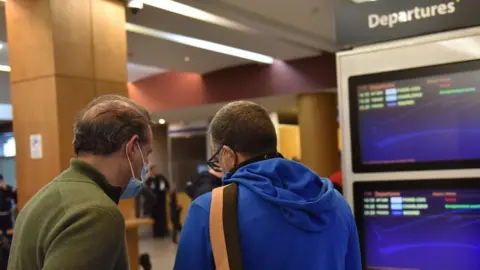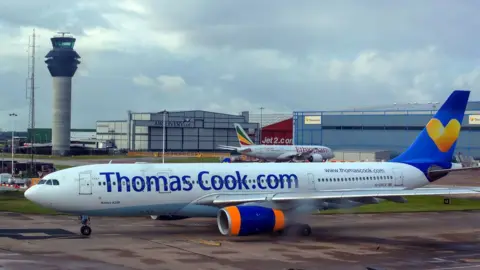Manchester Airport: Boss calls for frequent flyer tax alternative
 EPA
EPAA Manchester Airport boss has called for alternatives to a proposed frequent flyer tax to tackle the environmental impact of aviation.
The government has said there are no plans for a levy but its climate advisers had said it would slow growth.
Neil Robinson, a director at Manchester Airport Group (MAG), said the industry should focus instead on "living within an emissions budget".
He said it would challenge the industry to transition to cleaner flying.
Mr Robinson was speaking during a Manchester City Council meeting of its environment and climate change scrutiny committee.
He said people relied on flying for business, holidays, and it had social and economic benefits, adding: "Let's not lose that unnecessarily. Let's all focus on what we agree is the issue of emissions.
"If we can set out a trajectory for emissions that is consistent with the UK's carbon budgeting, consistent with Paris [climate agreement], then we need to challenge the industry to live within it and the industry has a challenge to deliver that."
A number of councillors said they were "shocked" and "disappointed" by his comments, the Local Democracy Reporting Service said.
 PA Media
PA MediaData shows that, in the UK, 70% of flights are made by a wealthy 15% of the population, with 57% not flying abroad at all.
The government held a consultation earlier this year on aviation tax reform but said there were no plans for a frequent flyer levy.
Mr Robinson said he understood the "strength of feeling" but believed that an "emissions budget" was a better option.
"It challenges the industry to change and transition to a cleaner way of flying.
"Because if it doesn't and it's not successful in doing that, it won't be able to grow, so it becomes an existential issue for the industry that it has to adapt and evolve and become cleaner," he said.
Airlines were already investing in more fuel-efficient aircrafts and airspace could be "modernised", he added.
Bristol and Leeds Bradford airports recently pledged to become carbon-neutral airports by 2030.

Why not follow BBC North West on Facebook, Twitter and Instagram? You can also send story ideas to [email protected]
